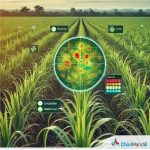A research team from Guangxi University in China has successfully decoded the genome of the modern cultivated sugarcane variety Xintaitang No. 22 (XTT22), providing valuable insights into the complex allopolyploid genome of sugarcane and its evolutionary processes.
Sugarcane is a crucial crop for the production of sugar, alcohol, and bioenergy, contributing significantly to both economic and agricultural sectors. XTT22 was the dominant sugarcane variety in China for 15 consecutive years, and over 90% of the country’s fourth and fifth-generation sugarcane varieties were developed using it as a parent.
Liu Yaoguang, an academician with the Chinese Academy of Sciences (CAS), noted that the genome of XTT22, decoded in this study, represents the most complete and highest-quality genome assembly of modern cultivated sugarcane to date, reported Chinese news agency Xinhua.
Another CAS academician, Han Bin, pointed out that since the 1990s, the Sugarcane Expressed Sequence Tag (SUCEST) project has brought together countries like Brazil, France, China, Australia, and the United States to collaborate on advancing sugarcane genomics.
Earlier attempts to decode sugarcane’s genome faced major challenges, such as incomplete chromosomes and fragmented sequences, making it difficult to obtain a fully accurate and complete genome of the modern cultivated sugarcane.
“This study is like creating a detailed ‘map’ of the sugarcane genome. In the past, the ‘map’ was vague, and we could only navigate it roughly,” said Zhang Jisen, leader of the research team at Guangxi University. “Now, every ‘street’ and even every ‘room’ on the ‘map’ is clearly labeled,” he added.
Traditionally, sugarcane breeding relied on hybridization methods where parent plants were chosen based on experience, and the performance of their offspring was observed. However, this process was often time-consuming and inefficient.
With the advances in genomics, scientists can now use this “genomic map” to pinpoint genes directly linked to traits such as yield and sugar content. This allows for more precise and efficient breeding, leading to better-targeted improvements.
“Thanks to the widespread use of genomics in sugarcane breeding, we expect further enhancements in sugarcane yield, sugar content, and disease resistance,” said Zhang.
The research was recently published in Nature Genetics.
For more details and in-depth insights, keep reading ChiniMandi, your go-to source for the latest news on the Sugar and Allied Sectors news.












